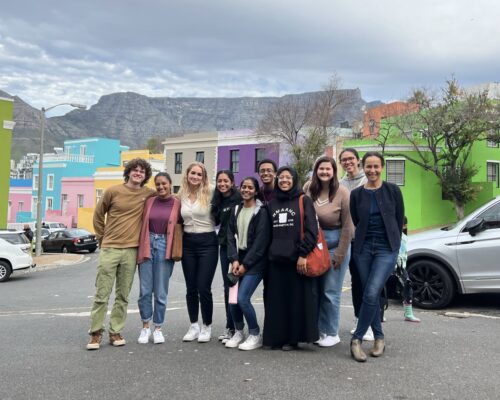Back in February of this year, we were in the interview stage of our DukeEngage journeys. Here, our professor posed a question to each of us who had made it to this part of the process: What does responsibility look like? What is it, for whose benefit, and what does that look like in a program like DukeEngage? As the program progressed and as we begin to hurtle towards the end of our time here in Cape Town, I’ve found myself thinking increasingly about this question of responsibility.
Social structures are based upon the idea of responsibility, that we all have a part to play in the way society is built. There are many kinds of responsibility: causal, moral, capacity, and collective responsibility, to name a few. The one most intriguing to me, and perhaps the most important, is collective, or shared responsibility. A collective responsibility implies that we all have a stake and part to play in our communal and individual futures. To be responsible for something means being accountable for an aspect of organized social life, and owing others things means finding ways to dig deeper and imagine better futures for each other and for ourselves. I find myself compelled by the idea of collective responsibility and striving to make things better for all of us.

Organizing and resistance inherently comes from this idea of collective responsibility. Being at the Bertha House, a hub for community organizers in Cape Town, highlights how important community is to fighting for a better world. At the beginning of a workshop we attended at the Bertha House, a group of activists came in singing together, their voices entangled to create beautiful music. They sung songs of freedom and resistance in part influenced by prior struggles under apartheid that have evolved over the past 28 years to become applicable to current resistance efforts. This demonstration of community makes clear how important a collective imagination is to informing change. Every person’s voice impacts how a song is heard and felt; similarly, every person’s thoughts and actions impact the vision for a new world for every one of us.
In the play Kunene and the King, the Black character, a nurse named Lunga Kunene, fights against the implicit and explicit racism he experiences at the hands of Jack Morris, a white man suffering from terminal cancer. Kunene refuses to sleep in the outside quarters originally meant for Black maids and other workers, instead insisting on staying in Morris’ son’s room inside the house itself. When making tea, Kunene quietly gives the tin mug intended for the Black helpers of the house to Morris, taking the “proper” cup and saucer for himself. These forms of resistance against the antiquated racist practices of apartheid are personal ones, but they represent more than just an individual response. They are part of a collective obligation to reverse such practices, a communal effort to reinvent, even though it may take offending each white man one by one. Even the Jack Morris’s of the world are part of this obligation as they must unlearn the habits of the past and relearn new ones.
These past eight weeks in Cape Town have opened my eyes to responsibility and how it is harnessed by those who wish to enact change and work for a better future.
